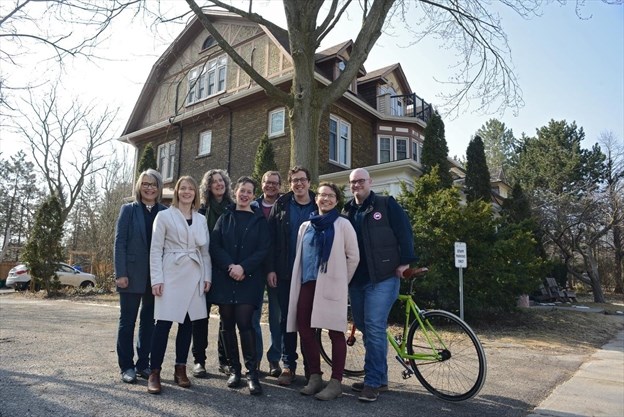Union: Sustainable Development Co-operative has 10 startup members and needs 50 or 60 more to help purchase a building in Kitchener or Waterloo. They plan to provide rental housing for new government-assisted refugees.
A new housing co-operative is looking for investors to help shake up the way rental housing is done in this region.
Union: Sustainable Development Co-operative has 10 startup members and needs 50 or 60 more to help purchase a mixed-use residential and commercial building in Kitchener or Waterloo. They plan to partner with Reception House Waterloo Region to provide rental housing for new government-assisted refugees in this first building.
“We have a lot of wealth in this community and if we can redirect even a small percentage of that toward creating real social change as our community is going through this really exciting period of growth, let’s make sure that growth helps everyone,” said Sean Campbell, one of the founding members of the co-op and its executive director.
Membership shares cost $500 and members can invest $1,000 to $10,000 per property. Campbell said he expects a rate of return of three or four per cent rate on that investment. The co-op would own the building and Reception House would act as the landlord.
Kathie Must, manager of fundraising and donor relations with Reception House, said refugees face a number of challenges when looking for safe, affordable housing in the region. Housing costs continue to rise, and a lack of credit history or references is also a hurdle.
“Government-assisted refugees receive a modest shelter and living allowance for 12 months, but it does not match market rates for rentals today in our region,” she said.
Campbell said the co-operative plans to purchase its first property by the end of this year. It’s looking for properties close to the light rail transit corridor that offer retail or food service on the ground floor along with two or three residential units above.
Once the first project is complete, the co-operative will look to repeat the process in other areas of the region. Rather than flip the property for a profit in a few years time, it intends to operate like a land trust and hold on to the property indefinitely.
“That’s really what we’re doing here, creating another avenue to build positive change,” said Campbell. “If we hold on to a property, we’re able to push back, over the long term, on price increases.”
Actual rent rates haven’t been determined, he said.
“With Reception House, we’re targeting, at most, average market rent and that will depend on the number of units,” said Campbell. “Our long-term mandate is to keep rents as flat as possible to make it increasingly affordable for both residential and commercial tenants.”
Every member will get an equal vote in how the organization is run, and any member can run to be on the board of directors. The co-operative governance structure should allow the organization to draw on a diverse range of skills and perspectives, they say.
Co-operatives in Canada date back to the turn of the 20th century. There are more than 1,500 operating in 400 communities in Ontario. Non-financial co-operatives in this province have more than $30 billion in assets and generate $2.1 billion in revenue, according to the Ontario Co-Operative Association.
Reception House has been helping to bring government-assisted refugees to this region for more than three decades. It welcomed 300 people in 2018, but Must said it’s getting more difficult to find housing in a timely manner.
In the past it has taken three or four weeks for a family to secure permanent housing, she said, but that timeline has stretched into several months, meaning the refugees have to stay longer at Reception House’s temporary residence at 101 David St. in Kitchener. Single people and large families are the most difficult to house.
The partnership with the co-op has the potential to go beyond simply offering refugees a roof over their heads, Must added.
“Perhaps the commercial tenant on the ground floor may offer employment for the refugees — or the opportunity to learn and practise English,” she said. “It’s building community.”

